S HER BO RNE GIR L S SIX T H FORM
MUSIC TECHNOLOGY* Why study Music Technology? This course involves the composition of popular music (electronic, dance, rock and pop) and/or film music,sequencing, and recording work in the music studio. The software used throughout the course is Logic Pro X and Ableton Live, both on Apple iMac computers. The Course The course is designed to allow pupils to expand on their knowledge of music production, composition, DJing skills or, for those new to Music Technology, an opportunity to learn about electronic and popular music. Key features • Flexible specifications with different options to suit different types of musicians, whether classical, jazz, DJ or rock. • An opportunity to get to know your way around the state-of-the-art recording facilities within the music studio. • An opportunity to get to know how electronic music is arranged and composed. • An opportunity to study popular music (rock, hip hop, electronic) from the 1950’s onwards.
Course structure Unit 1: Multi Track Recording (20%): An opportunity to record a band or an ensemble and then mix it down and, using best production techniques, produce a recording of the highest quality. All songs will be from the popular music context and not include any genres outside of pop, rock, EDM or electronic music. Some of the songs recorded in previous years include those by The White Stripes, Adele, Coldplay, The Stokes and Led Zeppelin. Unit 2: Composition (20%): An opportunity to arrange a piece of music or a song for different instruments and voices, using the facilities within the music studio and/or the classroom suites. Students will create an original composition, totalling no more than 3 minutes. Students will develop the skills to create and manipulate sounds in imaginative and creative ways, learning how to create music in Ableton Live. Unit 3: History of Recorded Music (25%): Alongside the practical coursework, students will develop their knowledge and understanding of recording and production techniques of popular genres (rock, pop, dance and electronic music) through the following: • Recording and production techniques for both corrective and creative purposes • Principles of sound and audio technology • Development of recording and production technology Unit 4: Producing Music (35%): The creation of a recorded piece of music based on editing, mixing and production techniques. This will develop an understanding of sound, audio technology and expand upon recording and production techniques. This part of the course will focus on the practical ways music is produced where students will have hands-on experience with mixing and mastering music. Who can give me more information? Mr Davey benjamin.davey@sherborne.org
48
* Taught at Sherborne School





























